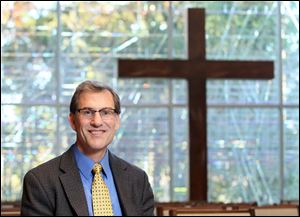
Professor calls for change in Catholicism
Church's moral authority lost, Corpus Christi audience told
11/2/2011
Peter Feldmeier, professor of Catholic studies at UT, blames much of the problem on the clergy sexual-abuse scandal.
In his first public lecture in Toledo, Peter Feldmeier, the new professor of Catholic studies at the University of Toledo, said the Catholic Church has lost much of its moral authority -- largely because of the clerical sexual-abuse scandal -- and won't get it back unless significant changes are made.
The opportunity "may be now or never," he said in an hour-long talk at Corpus Christi University Parish on Tuesday evening.
Mr. Feldmeier said some of the loss of authority is warranted and some is without foundation, but the challenges the Catholic Church is facing and the damage done to its reputation are real and substantial.
U.S. bishops have dealt responsibly with the abuse crisis, he said, citing the 2002 Dallas Charter and its "zero-tolerance" policy ousting priests facing a single credible allegations of abuse. Yet he said the scandal "continues to haunt us" a decade after it began, noting that Bishop Robert Finn and the Catholic Diocese of Kansas City-St. Joseph, Mo., were indicted last month on misdemeanor charges of failure to report child abuse.
Public outrage over the abuse was intensified by the way some church leaders handled the crisis, Mr. Feldmeier said. He cited as an example a claim by prominent Vatican officials that the scandal was "manufactured by anti-Catholic media" and a cardinal's comment "comparing the media persecution of the church as similar to what Hitler and Stalin did in the 1930s and '40s."
He said many bishops have failed to develop good relationships with the media to the detriment of the church. "If part of our moral authority problem is public relations, why would you distance yourself or, worse, alienate yourself from the media? If our moral house is in order, why not be transparent to and engaging with the press?" he asked.
Mr. Feldmeier, 50, who taught at the University of St. Thomas in St. Paul before joining UT's faculty this fall, cited a "shocking and striking" report in the New York Times on the clerical abuse cover-up in Ireland that said, "The awe, respect, and fear the Vatican once commanded have given way to something new -- rage, disgust, and defiance."
Also eroding the church's moral authority is a perception that its leaders are "obsessed with sex" -- a view that persists, he said, despite being wrong and unfair.
Many Americans feel that way because of the bishops' stance on issues such as birth control, same-sex partnership, and abortion, he said, adding that abortion is a matter of human rights but is perceived by many as a sexual issue.
Mr. Feldmeier compared public reaction to church teachings on sexual issues to U.S. Treasury Secretary Timothy Geithner's exhortations to European leaders in September to keep their national debt down.
The Europeans derided Mr. Geithner not because his advice was bad but because his own country's debt was $15 trillion and counting. Similarly, he said, Catholics and non-Catholics alike are not swayed by the moral teachings of church leaders who have failed to keep their own house in order.
"Here's the lesson," Mr. Feldmeier said. "Even if you're right, if your authority has been compromised, not only will you have no influence but you can even make things worse for yourself."
The U.S. Catholic Church also needs to overcome a perception held by many that it is Republican, an impression fueled mostly by the church's and the GOP's shared opposition to abortion, he said, and to shake an image that the Catholic Church is "a staunch, closed-minded, regressive institution."
Church leaders have demanded "uniformity of thinking" and squelched dialogue among the faithful, he said, which has led to "Vatican bullying" and "a culture of myopia" in which people are expected to "pray, pay, obey, and get out of the way."
Mr. Feldmeier called on church leaders to "respect plurality," allowing for discussion among legitimate voices, and to give disaffected laity more voice on how the church's authority is exercised.
Contact David Yonke at: dyonke@theblade.com or 419-724-6154.